THE THREE DISAPPEARANCES OF SOAD HOSNI
El documental gira en torno a la vida de Soad Hosni, la estrella del cine egipcio que se suicidó en Londres en 2001 a la edad de 59. Su trágico final conmovió al mundo árabe y permite abordar las representaciones de las mujeres árabes hoy en día, tanto en Oriente como en Occidente.
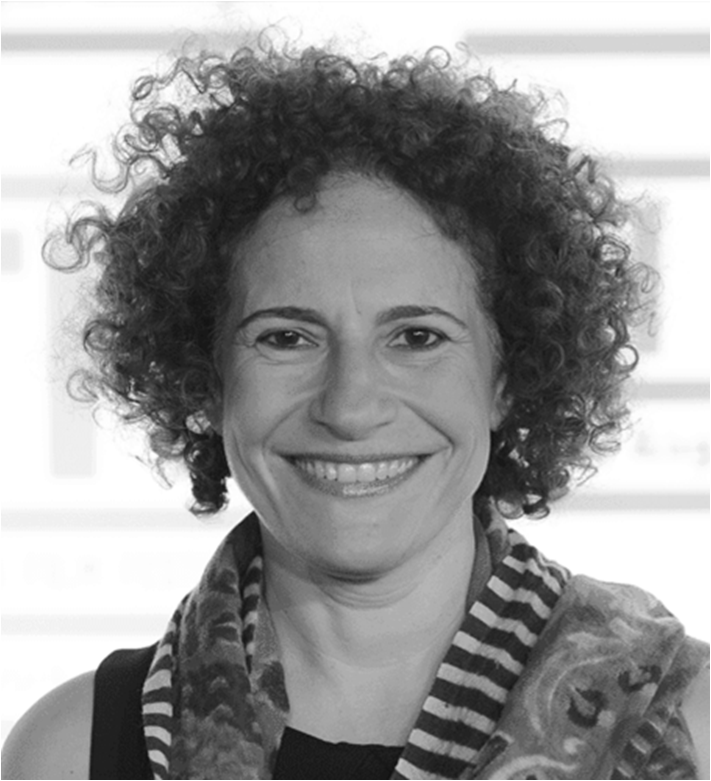
Rania Stephan es una libanesa realizadora y artista de vídeo. Ella es mejor conocida por su primer largometraje Los tres desapariciones de Soad Hosni (2011).
THE REVOLUTION OF THE YEAR
Diciembre de 2011. El joven egipcio Saleh Ferky estampa la edición de Time Magazine que eligió al manifestante (“The Protester”) como la persona del año. Un año más tarde, viviendo por primera vez bajo un gobierno supuestamente democrático, él y sus amigos sienten el sabor amargo que dejó la revolución. Deprimido por la situación actual de su país e incapaz de seguir adelante, Saleh decide ir a Siria. Más allá de las sombras de una guerra civil, pretende entender lo que significa ser un joven libre.
December 2011. Young egyptian Saleh Ferky stamped the edition of Time Magazine that elected The Protester as the person of the year. A year later, living for the first time under a supposedly democratic government, he and his friends feel the bitter aftertaste of the revolution. Depressed with the present situation in his country and incapable to move on, Saleh decides to go to Syria. Beyond the shadows of a Civil War, an attempt to understand what it means to be a free young man.
Diogo Faggiano
Es un director de cine brasileño. Estudió cine en la Facultad de Comunicaciones y Artes de la Universidad de São Paulo. 2007: Ed. COPAN (cortometraje documental), guión y dirección. Ganó el Premio de Investigación de Idiomas del 12 º Festival Brasileño de Cine Universitario. 2010: Zeit del Geist (cortometraje de ficción), guión y dirección. Ganó el Premio Contribución Artística en el 15º Festival Brasileño de Cine Universitario y el Premio a Mejor Montaje, Mejor Sonido y Mejor Película en el 10º Festival de Cine Universitario (NOIA). 2012: The Last Frontier (cortometraje documental), filmado en Indonesia.
Is a Brazilian film director. He studied cinema at the School of Communications and Arts, University of São Paulo. 2007: Ed. COPAN (short documentary), screenplay & direction * Language Research prize at the 12º Festival Brasileiro de Cinema Universitário 2010: Zeit to the Geist (short fiction), screenplay & direction * Artistic Contribution prize at the 15º Festival Brasileiro de Cinema Universitário * Best Montage, Best Sound, Best Film at the 10º Festival de Cinema Universitário (NOIA) 2012: The Last Frontier (short documentary), recorded in Indonesia.
PAÑUELOS PARA LA HISTORIA
Nora Cortiñas (Madres de Plaza de Mayo) viaja al Kurdistán turco, donde estuvo en 2011. Allí se reencuentra con las Madres por la Paz, quienes tienen a sus hijos desaparecidos. La madre argentina se ofrece como veedora internacional para exigir justicia. La situación política-cultural que viven las mujeres kurdas le mostrará que “justicia” es una encrucijada entre el padecimiento y la vida alegre.
Nora Cortiñas (Mothers of Plaza de Mayo) travels to Turkish Kardistan, where she was in 2011. There she meets again with Mothers for Peace, whose children are missing. The Argentinian mother offered to be the international supervisor to demand justice. The political and cultural situation that Kurdish women live will show “justice” is a crossroad between suffering and a happy life.
Alejandro Haddad
Con 34 años, Alejandro Haddad es docente de escuela, periodista y realizador documental. Colabora en la revista Crisis. En 2008 grabó el cortometraje “La queja de los cadáveres”, y en 2009 “Av! Su! Mai!” en territorio kurdo de Turquía. “Pañuelos para la historia” es el primer largometraje documental.
At 34, Alexander Haddad is a school teacher, journalist and documentary filmmaker. He collaboratea in the magazine Crisis. In 2008 he produced the short film " La queja de los cadáveres) and in 2009 " Av! Su! Mai!" in Turkey's Kurdish territory. "Scarves for history" (“Pañuelos para la historia”) is the first feature documentary.
EL OBJETO DE MI AMOR
Eloísa Tarruella, protagonista del film, parte hacia la búsqueda de historias de amor dignas de ser documentadas. La literatura es su principal aliada. En este recorrido, ella encuentra a tres parejas: Ariadna y Georges, una mujer argentinay un hombre libanés; Laura y Juan, dos viajeros nómadas que recorren el mundo a dedo; Silvina y Andrea, dos mujeres que luchan por sus derechos, y hoy son madres de trillizos. Cada pareja tiene un objeto personal que imprime una huella en cada historia. Un objeto de amor, el objeto de mi amor.
Eloísa Tarruella, main character of the film, set off to find stories of love worth of being documented. Literature is her main ally. On that journey, she finds three couples: Ariadna and Georges, an Argentinian woman and a Lebanese man; Laura and Juan, two nomadic travelers who hitchhike all around the world; Silvina and Andrea, two women who fight for their rights and now they are mothers of triplets. Each couple has a personal object that stamps a mark on each story. An object of love, the object of my love.
Eloísa Tarr uella - Andrés “Gato” Martínez Cantó
Eloísa Tarruella, es Directora, autora y actriz de cine (ENERC-INCAA) y Lic. Artes Audiovisuales IUNA. En cine dirigió el film "Gené, en escena" (2010) que obtuvo reconocimientos de público, crítica y premios (Fondo Nacional de las Artes y Tv digital INCAA); "Otoño" (2008) premio UNIFEST Madrid 2008. En el ámbito teatral fue autora y directora de "Amorar", pieza que estuvo tres temporadas en cartel.
Eloísa Tarruella is a director, author, film actress (ENERC – INCAA) and holds a Bachelor Degree in audiovisual arts (IUNA). She directed the film Gené, en escena (2010) which got the recognition from the audience, critics ans was granted awards such as The Argentine National Fund for Arts and Digital TV INCAA; Otoño (2008) UNIFEST award, Madrid 2008. As regards theater plays, she was the author and director of Amorar, which was showed during three seasons.
Andrés "Gato" Martínez Cantó, es Productor y Realizador Audiovisual. Entre sus films se destacan: "El Almafuerte"(2010) Premio Sudestada Paris, "Nicaragua, el sueño de una generación" (2012) Premio Fesaalp al Mejor documental (2012), entre otros.
Andrés “Gato” Martínez Cantó is a producer and audiovisual producer. He made several films, such as El Almafuerte (2010), which was granted the Sudestada Paris Award, and Nicaragua, el sueño de una generación (2012), Fesaalp Award for Best Documentary.
Este ensayo audiovisual se sumerge en la historia de Elad, quien fue educado en el sionismo y migró a Israel en la crisis económica de Argentina en el 2001. En este viaje se encuentra ante dilemas éticos trascendentales luego de ser expulsado del ejército por locura, y reflexiona profundamente sobre su identidad judía y su condición de humano ético ante el genocidio palestino.
This audiovisual essay submerges in Elad’s life story, being raised within a Zionist family and migrating to Israel after the economic crisis hit Argentina in 2001. On this trip he is confronted against transcendental ethical dilemmas after being discharged from the army for insanity; and reflects on his Jewish identity and his condition as an ethical human being in the face of the Palestinian genocide.
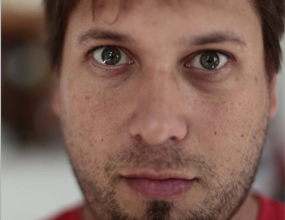 Elad regresó a Rosario luego de vivir seis años en el exterior y estudió en la EPCTV (Escuela Provincial de Cine y TV) de Rosario entre 2008 y 2011. Es humano, explorador, inquieto y rebelde. Éste es su primer proyecto audiovisual como director. Escribe hace años. Actualmente trabaja como fotógrafo independiente y también en la Federación de cooperadoras escolares del departamento Rosario. Forma parte de equipos interdisciplinarios de performances artísticas y es miembro de grupos de varones antipatriarcales que organizan encuentros culturales para una nueva masculinidad.
Elad regresó a Rosario luego de vivir seis años en el exterior y estudió en la EPCTV (Escuela Provincial de Cine y TV) de Rosario entre 2008 y 2011. Es humano, explorador, inquieto y rebelde. Éste es su primer proyecto audiovisual como director. Escribe hace años. Actualmente trabaja como fotógrafo independiente y también en la Federación de cooperadoras escolares del departamento Rosario. Forma parte de equipos interdisciplinarios de performances artísticas y es miembro de grupos de varones antipatriarcales que organizan encuentros culturales para una nueva masculinidad.
Elad returned to Rosario (Sante Fe, Argentina) after six years of living abroad and studied at the Provincial School of Cinema and TV between 2008 and 2011. He is a Human, an explorer, restless, and rebellious. This is his first audiovisual project as a director. He has been writing for years. He is currently working as a freelance photographer and at the Federation of School Associations in Rosario. He is a member of a collective of anti-patriarchal males who organise cultural meetings in pursuit of a new masculinity.
Sinopsis:
Nizar es un joven palestino que nació en Ramallah y vive en Jerusalén. Su historia es tan representativa de la ocupación como otras miles: abuelos echados de sus casas y una larga lucha para que su generación viva con un poco más de libertad. Todos los fines de semana, Nizar ve representada la historia de su nación en un equipo de fútbol que juega con los colores de Palestina. El equipo ha sido seguido por su abuelo y su padre por radio, boletines o algún medio del pasado, pero Nizar puede verlo por internet. Al estadio no ha podido ir ninguno. El equipo juega en Chile, Sudamérica, a 13.000 kilómetros de distancia. Pero el lazo que los une es más grande que el océano que los separa.
Synopsis:
Nizar is a Young Palestinian who was born in Ramallah and lives in Jerusalem. His story is as representative of the occupation as other thousands: grandparents who were thrown out of their homes and a family who has struggled for the next generation to enjoy a bit more freedom. Every weekend, Nazir sees his Nation’s story expressed through a football team that plays with the representative colours of Palestine. In the past, his granddad and his father followed the team’s developments via radio or TV, but Nazir can now use the internet. None have been able to attend a game at a stadium. The team plays in Chile, South America, 13,000 kilometres away. But the bond that ties them together is stronger than the ocean that separates them.
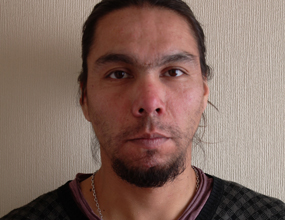 Aldo ha desarrollado su carrera haciendo videoclips para músicos y artistas visuales, para pasar al trabajo documental en los últimos años. Desde 2004 lleva a cabo un trabajo independiente en las áreas de dirección, montaje y fotografía. Trabajó en canales de televisión, como CNN Chile, antes de fundar su propia productora, Artefacto visual.
Aldo ha desarrollado su carrera haciendo videoclips para músicos y artistas visuales, para pasar al trabajo documental en los últimos años. Desde 2004 lleva a cabo un trabajo independiente en las áreas de dirección, montaje y fotografía. Trabajó en canales de televisión, como CNN Chile, antes de fundar su propia productora, Artefacto visual.
Entre los artistas que han pasado por su lente están Ana Tijoux, Cómo Asesinar a Felipes, Marcos Meza, Solo di Medina, Chico Trujillo y el muralista Inti Castro.
Aldo is a filmmaker who developed his style shooting video clips for musicians and visual artists and later working on documentaries. He has worked as a freelance director, editor and cinematographer for the last ten years. He worked for several TV stations before founding his own production company, called Artefacto visual. He has shot Ana Tijoux, Cómo Asesinar a Felipes, Marcos Meza, Solo di Medina, Chico Trujillo, the muralist Inti Castro, etc.
Este largometraje documental es una trilogía que da cuenta del proceso histórico que ha traído por más de un siglo a miles de palestinos a Chile, constituyéndose en esta República la colectividad palestina más numerosa fuera del Mundo Árabe. Son tres historias, tres personajes que dan vida y profundidad a cada uno de los procesos migratorios desde Palestina hacia Chile.Con una conformación estética que mezcla material de archivo, entrevistas actuales y un audaz movimiento de cámara, este revelador e inédito documental rescata una historia empolvada en el olvido y al mismo tiempo reconstruye el contexto histórico y político en el que se insertan cada una de las historias; la de Anuar, la de Najle y la de Fardos.
This feature documentary is a trilogy that accounts for the historical process that for over a century has seen Palestinians migrate to Chile and form the largest Palestinian community outside the Arab World. It tells three stories about three characters that bring life and depth to each of the migratory processes.With aesthetics that combine archive material, updated interviews, and audacious handling of the camera; this revealing and unprecedented documentary blows the dust off a story buried in oblivion and, at the same time, it reconstructs the historical and political context within each of Anuar’s, Najle’s and Fardos’s stories.
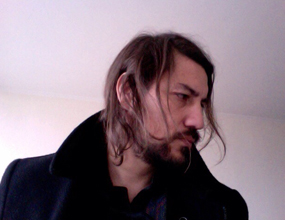 Nacido en Santiago de Chile en 1971, Piña estudió cine en Columbia College en Chicago y antropología socio-cultural en la Universidad de Illinois. Luego, realizó trabajos en Estados Unidos, Egipto, y Chile. Recientemente dirigió un programa acerca de músicos contemporáneos chilenos en el diario digital El Mostrador.
Nacido en Santiago de Chile en 1971, Piña estudió cine en Columbia College en Chicago y antropología socio-cultural en la Universidad de Illinois. Luego, realizó trabajos en Estados Unidos, Egipto, y Chile. Recientemente dirigió un programa acerca de músicos contemporáneos chilenos en el diario digital El Mostrador.
Born in Santiago de Chile in 1971, Piña studied Cinema at the Columbia College in Chicago and Sociocultural Anthropology at the University at Illinois. He then went on to work in the USA, Egypt and his native Chile. He has recently directed a programme about contemporary Chilean musicians for the digital newspaper El Mostrador.
SINOPSIS
En la remota e inhóspita Patagonia argentina de principio de 1900, tribus nativas e inmigrantes árabes compartieron un destino común de persecución y limpieza racial, forjando un fuerte sentido de pertenencia y resistencia que permanece hasta hoy. El desencanto, homicidio y canibalismo persiguieron a esas comunidades y 1001 Noches patagónicas devela cuán lejos el gobierno argentino y la alta sociedad llegaron para esconder la verdad.
In the remote and inhospitable Argentinean Patagonia of the early1900s, native tribes and Arab immigrants went to share the same destiny of persecution and racial cleansing forging a strong sense of belonging and resistance that remains until today. Deception, murder and cannibalism haunted those communities and 1001 Patagonian Nights unveils how far the Argentine government and high society would go to hide the truth.
BIOGRAFÍA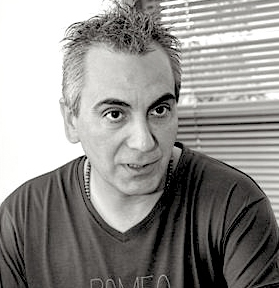 Javier López Actis nació en 1964 y se graduó del Centro Experimental de Realizaciones Cinematográficas del INCAA en 1989. Ha realizado seminarios con destacadas figuras del medio y producido propios. Fue asistente de producción de los largometrajes documentales Gombrowicz y Que vivan los Crotos y Matar al Abuelito. Como Director, estuvo al frente de Las cifras falsas, La historia es la misma, Expedición isla de los Estados, etc. Además, ofició de coguionista de episodios de la serie documental “Googleados”. También ha sido organizador y jurado de festivales locales.
Javier López Actis nació en 1964 y se graduó del Centro Experimental de Realizaciones Cinematográficas del INCAA en 1989. Ha realizado seminarios con destacadas figuras del medio y producido propios. Fue asistente de producción de los largometrajes documentales Gombrowicz y Que vivan los Crotos y Matar al Abuelito. Como Director, estuvo al frente de Las cifras falsas, La historia es la misma, Expedición isla de los Estados, etc. Además, ofició de coguionista de episodios de la serie documental “Googleados”. También ha sido organizador y jurado de festivales locales.
Javier López Actis was born in 1964 and graduated from the National Filmmaking and Film Experimentation School of the INCAA in 1989. He worked as a production assistant for the documentary feature films Gombrowicz, Que vivan los crotos and for the film Matar al abuelito. As a director he is responsible for Las cifras falsas, La historia es la misma, Expedición isla de los Estados, etc. He also co-wrote episodes of the documentary series "Googleados" (“Googled”). He has also organised and been a member of the jury at local festivals.
SINOPSIS
Vengo de una familia de larga tradición judía que, luego de siglos de persecuciones, imaginó a Israel como un lugar donde estar protegidos. Cuando por fin logré ir en el año 2000, estalló la segunda Intifada. Por una mezcla de aventura y curiosidad, comencé a cuestionarme cosas y esos cuestionamientos me llevaron a Jerusalén, a Cisjordania y a Gaza. Viajando con mi cámara como única compañera, pasé tres meses viviendo en casas de palestinos. A cada paso que daba, descubría otra tragedia; y luego, a otra versión de la historia que hasta entonces había conocido. Volví a Argentina e hice a un lado el documental. ¿Por qué tardé 15 años en reconstruir aquel viaje?
I come from a family of longstanding Jewish tradition; after centuries of persecutions, I pictured Israel as a place where to be safe. When I finally got there in the year 2000 the second Intifada began. Driven by a mix of adventure and curiosity, I started questioning myself and everything around me and these questionings led me to Jerusalem, the West Bank and Gaza. I stayed in the houses of Palestinians as I travelled, camera in hand. Every step I took led me to another tragedy; and after that, to another version of the story that I knew until then. I came back to Argentina and put the documentary aside. Why did I take 15 to reconstruct that journey?
BIOGRAFÍA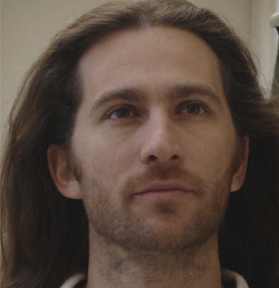 Nicolás Ávruj: Socio fundador de Campo Cine. Productor de largometrajes, documentales y de series de TV.
Nicolás Ávruj: Socio fundador de Campo Cine. Productor de largometrajes, documentales y de series de TV.
Como director ha dirigido los documentales La ley, Clementina y Por quién pelean los gallos. También ha dirigido varios videoclips para bandas de rock y editado varios largometrajes documentales.
Nicolás Ávruj: Founding partner of Campo Cine. He is also a feature film, documentary and TV series producer. As a director, he has made the documentaries The Law, Clementina, and Por qué pelean los gallos. He has directed several video clips for rock bands and edited several feature documentaries as well.
SINOPSIS
“Los viejos van a morir, los más jóvenes, a olvidar”. Ésa fue la previsión de David Ben-Gurion, primer ministro israelí entre los años 1948 y 1953, sobre la generación de refugiados palestinos que seguiría a los 750 mil expulsados de Palestina durante la Nakba (1947-1948). Según él, los jóvenes ya no recordarían los dolores de sus padres y abuelos ni exigirían el retorno a su tierra. Problematizar esa afirmación y entender el estado de la lucha palestina es el objetivo de este documental que une a jóvenes y ancianos en una narrativa sobre su tierra. Luego de 65 años, vamos a los campos de refugiados palestinos en Jordania para comprobar si el premier israelí tenía razón.
“The old will die and the young will forget”. That was the prediction made by David Ben-Gurion ─ Israel’s Prime Minister between 1948 and 1953 ─ about the generation of Palestinian refugees which would follow the 750,000 Palestinian who were banished during the Nakba (1947-1948). According to him the young would not remember their parents and their grandparents’ pain or demand their return to their land. To question this statement and to understand Palestine’s struggle is the main goal of this documentary which brings the young and the old in a narrative about their land. After 65 years we go into the Palestinian refugee camps in Jordan to see if the Israeli premier was in the right.
BIOGRAFÍA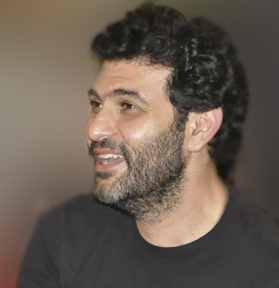 Hassan Abdul Hamid Zarif Hasan nació en Brasil, hijo de Miriam y Abdul Hamid ─palestinos oriundos de Al Janiah. Abdul había migrado en 1958 a causa de la fuerte crisis económica en Palestina luego de la implantación del Estado de Israel. En la guerra de 1967, Miriam y sus hijos fueron refugiados en Jordania y de allí viajaron a Brasil. Miriam y Abdul Hamid fallecieron en Jordania sin poder regresar nunca a Palestina. Hassan creció con las historias de sus padres sobre su tierra natal y el deseo de regreso. Vivió tres años en Jordania y uno en Palestina. Al filmar el documental identificó, en todas sus entrevistas, semejanzas con las historias de su propia familia. Desde mayo de 2011 está impedido de entrar en Palestina.
Hassan Abdul Hamid Zarif Hasan nació en Brasil, hijo de Miriam y Abdul Hamid ─palestinos oriundos de Al Janiah. Abdul había migrado en 1958 a causa de la fuerte crisis económica en Palestina luego de la implantación del Estado de Israel. En la guerra de 1967, Miriam y sus hijos fueron refugiados en Jordania y de allí viajaron a Brasil. Miriam y Abdul Hamid fallecieron en Jordania sin poder regresar nunca a Palestina. Hassan creció con las historias de sus padres sobre su tierra natal y el deseo de regreso. Vivió tres años en Jordania y uno en Palestina. Al filmar el documental identificó, en todas sus entrevistas, semejanzas con las historias de su propia familia. Desde mayo de 2011 está impedido de entrar en Palestina.
Hassan Absul Hamid Zarif Hasan was born in Brazil to Palestine parents from Al Janiah. His father, Abdul, had migrated after the strong economic crisis in Palestine that succeeded the enforcement of the State of Israel in 1948. During the 1967 War, Miriam and her children became refugees in Jordan, from where they moved to Brazil. Miriam and Abdul passed away in Jordan without ever returning to Palestine. Hassan grew up to his parents’ stories of their native land and their wish to go back. He lived in Jordan for three years and in Palestine for one. While filming his documentary, he identified similarities with his family’s story in all of his interviewees. He hasn’t been allowed in Palestine since 2011.